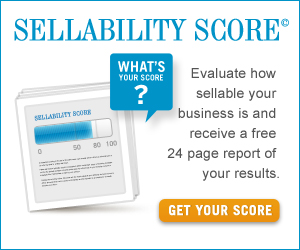Republished with permission from Built to Sell Inc.
Many business owners believe the act of selling their business is similar to passing the baton in a 400 metre relay: once you’re finished running, you get to relax. In reality, buyers will insist that you stay on for a transition period – anywhere from six months to five years – during which time you continue to work in your business to help the buyer capitalize on the investment they’re making.
THE Question
At some point in the process of selling your business, a prospective buyer will ask you – usually quite casually – “Why do you want to sell your business?” These eight seemingly innocuous words have derailed more deals than any others.
Buyers ask THE question to evaluate how likely and willing you are to stay on or if you already have one foot out the door.
Obviously you don’t want to lie, but there is a right and wrong way to answer THE question. Answers like “I want to slow down a bit” or “I want to travel” or “we’ve got a baby on the way and I want to spend more time at home” communicate to a potential buyer that you plan on winding down when they take over. However, what they want to hear is your intention to help them realise the potential locked inside your business.
Here are some suggested responses based on your age.
If you’re under 40, you clearly aren’t ready to “retire” so you need to communicate that you see an upside in merging your business with theirs:
“In order for us to get to the next level, we need to find a partner with more <insert sales people, distribution, geographic reach, capital or whatever the partner brings to the table>.”
If you’re between 40-55 years old, most people will understand the need to shore up your personal balance sheet:
“I’ve reached a time in my life where I want to create some liquidity from the value I’ve created so far, and at the same time I want to find a partner who can help us get to the next level.”
If you’re over 55, you can start to talk about retirement, but you want to make sure you communicate that you still have lots of energy and passion for your business.
“I’m at a stage where I need to start thinking about retirement. It’s a long way off yet, but I want to be proactive.”
Rehearse your answer to THE question so it becomes a natural response when you are inevitably asked THE question by a potential buyer.
Financial planning for business owners is different. Following the same traditional financial planning methods appropriate for your employees will lead you down the wrong path. Your business is where your wealth is and planning how to access that wealth when it comes time to retire is key.
Wondering if you have a sellable business? The Sellability Score® is a quantitative tool designed to analyze how sellable your business is. After completing the questionnaire, you will immediately receive a Sellability Score out of 100 along with instructions for interpreting your results.
Why not find out now if your business is sellable?
This free online tool is the only no-risk step you can take to determine if your business is ready to get full value. Fast-track your analysis by taking advantage of this free, no-obligation free online tool.
This Sellability Score you instantly receive is a critical component to any business owner’s complete financial plan and is something that, until now, we have only made available to existing clients.
However, we recognized that there is value in knowing in advance of working with a financial planner whether or not your largest asset is ready to be exchanged for your retirement nest egg. Our view is that you are better to learn more about your businesses sellability today and find out how your business scores on the eight key attributes so that you can ensure you obtain full value.
If your business part of your retirement plan, finding out your sellability score will be the best 10 min. you could ever spend working “on” your business.
 For more free information on Creating A Business Owner’s Dream Financial Plan, you can listen to a free, eight part series we did exclusively for business owners. The show is also available to subscribe to for free via iTunes.
For more free information on Creating A Business Owner’s Dream Financial Plan, you can listen to a free, eight part series we did exclusively for business owners. The show is also available to subscribe to for free via iTunes.













